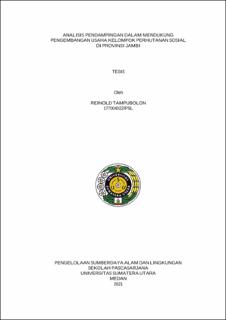Analisis Pendampingan dalam Mendukung Pengembangan Usaha Kelompok Perhutanan Sosial di Provinsi Jambi
Analysis of Assistance in Supporting the Social Forestry Group Business Development in Jambi Province

Date
2021Author
Tampubolon, Reinold
Advisor(s)
Fikarwin
Purwoko, Agus
Metadata
Show full item recordAbstract
The research analyzes the perfomence of assintants in social forestry group business development, business development after the presence of assistants, assistance strategies and group participation in 3 (three) Sosial Forestry Groups in Merangin Regency, Jambi Province. The research is carried out in the range of March to June 2021. The data are obtained through in-depth interviews, observations, Focus Group Discussions (FGD), questionnaires and they are analyzed qualitatively to answer the research questions. The research results explain that the performance or achievements of assistants in developing KUPS (Sosial forestry Group) at LPHD (Village Forest Management Institution) Lubuk Birah and Lubuk Beringin are not very good, namely the activities carried out have not reached the indicators of group success, while the performance of KUPS assistance at LPHD Rio Kemunyang is good with planned and targeted activities such as institutional strengthening, marketing activities, access to capital, business cooperation, agroforestry, and others. Business development in KUPS at LPHD Lubuk Birah and LPHD Lubuk after the presence of an assistant has not shown any change, village funds, and receiving carbon fund allocations. KUPS participation in developing a business at LPHD Rio Kemunyang is quite high, namely at the planning stage 77,33%, implementation 89,86% and evaluation 69,33%, while KUPS participation at LPHD Lubuk Birah and Lubuk Beringin is low because group activities are not running (vacuum). Based on the SWOT analysis, the assistants’ strategy in developing the business is in quadrant IV, which is defensive, so that the strategy that can be implemented by the assisants is to improve technical capabilities in business development, assessing the suitability of the group’s business results with market needs, increasing the intensity of communication and a friendly atmosphere with the group, consolidate group power and improve communication with government and apparatus in dealing with the threat of land clearing, increase motivation in developing group businesses and live in when carrying out assistance.
